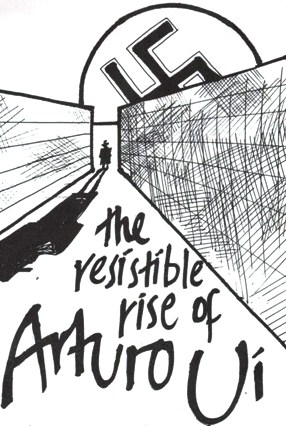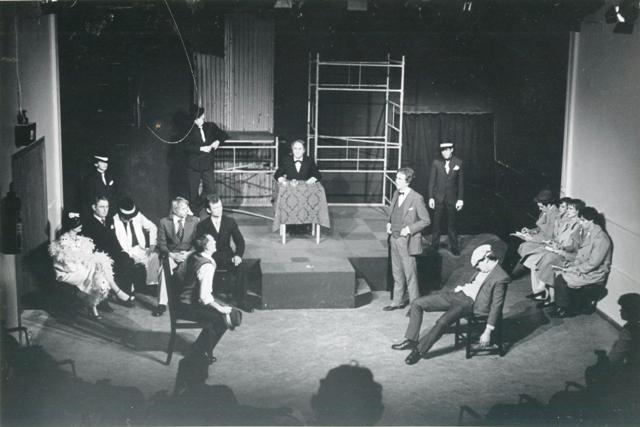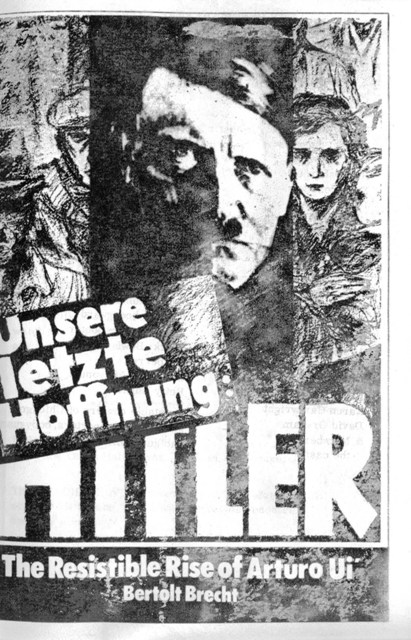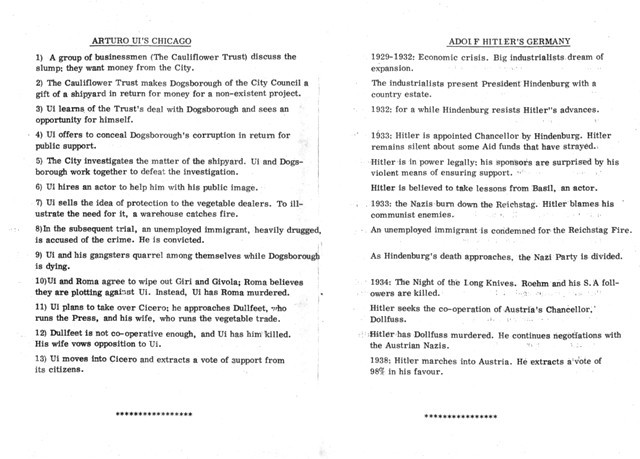The Bench Production

This play was staged at Havant Arts Centre, East Street Havant - Bench Theatre's home since 1977.
Characters
| Arturo Ui | David Urquhart |
| Ernesto Roma | David Penrose |
| Givola | John Scadding |
| Giri | Ray Osborne |
| Dogsborough | Peter Corrigan |
| Caruther | Chris Hall |
| Butcher | Peter Holding |
| Flake | Derek Cusdin |
| Young Dogsborough | David Roberts |
| Hook | Tony Adams |
| Prosecutor | Jim Charlton |
| Gaffles | David Dipnall |
| Inna | Alan Jenkins |
| Roma's Bodyguard | Keith Cobbald |
| Sheet | Tony Heptinstall |
| Clark | Anthony Elliott |
| Mulberry | Fred Jeffries |
| Dockdaisy | Jill Sawyer |
| Betty Dullfeet | Robbie Cattermole |
| Vegetable dealer | Karen Cartwright |
| Vegetable dealer | David Graham |
Crew
| Director | Jacquie Penrose |
| Stage Manager | Jo German |
| Assistant Stage Managers | Karen Cartwright Jon Philpot David Graham Kevin Fisher |
| Lighting | Sylvia Brierly |
| Sound | Alan Knight |
| Costumes | Jane Hart |
| Adviser | Jenny Graham |
Director's Notes
In presenting this portrayal of the rise of Adolf Hitler, Brecht draws on a wide variety of sources. He follows quite closely the events in Germany between 1932 and 1938 (he wrote the play in exile in 1941), and many of the characters in the play are parallels of historical figures. Arturo Ui is of course Hitler; Ernesto Roma is Ernst Roehm, the SA chief:Giri is Goering of the Air Ministry, and Givola is Goebbels, Hitler's propaganda chief. Dogsborough is Germany's President Hindenburg, and Clark is Von Papen, Chancellor and Hitler's Vice-Chancellor between 1933 and 1934.
Brecht also reflects the events of the Gangster Era in Chicago; the death of Roma is an echo of the St Valentine's Day Massacre. He drew, too, on the imagery of the movies - Hollywood's version of the gangsters in films such as 'Little Caesar' and 'Public Enemy'. Where he differed from the movie was in his belief that there was nothing to show that although a criminal may perpetrate great crimes, he himself remains always despicable. The laughter Brecht evokes with his gangsters' antics is not to ennoble or excuse them, and certainly not to trivialise them, but to show them up in all their awesome and sinister worthlessness.
The scenario that Brecht presents is recognisably possible at other times, past, present and future. He points to a time of recession: people are suffering increasing hardship in deteriorating circumstances. Crime is on the increase, unemployment soars, street violence erupts. An enemy is at work, the people are told; a scapegoat is sought and hounded, while the well-off, anxious to preserve their position, join in the hunt or merely look the other way.
Under similar circumstances Chicago produced Al Capone, and Germany produced Hitler, who rose to power on the backs of the the wealthy establishment, which thought it could both control and use him, but which was blinkered by its fear of the "enemy within" - communism and the alien Jew.
Brecht was not writing about a historical freak; his specific intention was to show that these circumstances could arise again and with the same results. Ui was resistible, Brecht argues, and urges his audience to find a lesson in that fact.
It is interesting to ponder on the fact that the Swastika is once more being daubed on the walls of our streets.
Jacquie Penrose
Reviews
The NewsAnon
Bench catch the spirit
The gangster world of Chicago in the 1930s was recaptured by Havant's Bench Theatre last night. More than 20 members of the theatre appeared on stage at Havant Arts Centre in Bertolt Brecht's 'The Resistible Rise of Arturo Ui', and the director (Mrs Jacquie Penrose) was delighted with the production. On the surface the play is set in the pre-second world was gangster world of Chicago. Arturo Ui, the gangster, is determined to take over the vegetable trade, first in Chicago and then on the neighbouring towns. But this story, with its echoes of Al Capone, runs a close parallel with the rise of Adolf Hitler in Germany between 1932 and 1938. "The play is hard-hitting and powerful. It is also in places extremely funny," said Mrs Penrose. The production continues tonight and tomorrow and from May 13 to 15 at 7.30 p.m. Tickets are £1.10 and 60p for students.
The News, 7th May 1982


